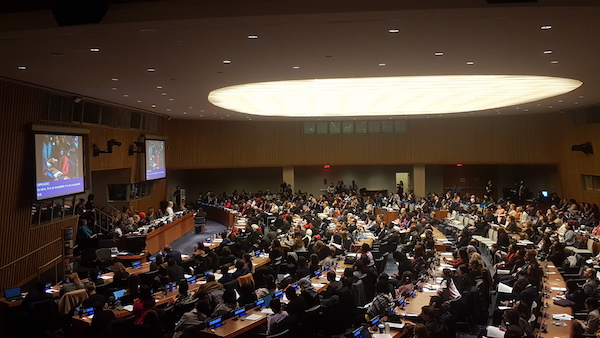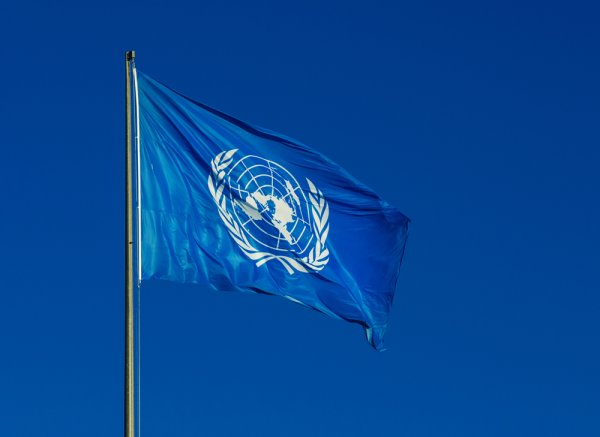Just after 8:30pm on Friday 22ndof March, I watched the gavel fall to mark the adoption of the agreed conclusions from the 63rdSession of the United Nations Commission on the Status of Women (CSW63). The CSW is an annual meeting in which countries negotiate ‘agreed conclusions’ by consensus, and which mark out the multilateral agenda for gender equality and the rights of women and girls.
The Agreed Conclusions of CSW63 showed a new recognition of sustainable infrastructure as a gendered issue. This included the acknowledgement of the negative impacts of inadequate, unreliable and unaffordable energy access on women’s safety and health, and women’s particular needs for affordable and safe public transport, free of harassment, to support their livelihoods.

CSW63 – Image supplied by the author
This is miraculous, given the global pushback against gender equality and women’s rights that shaped the fortnight’s process. Inside the negotiating room, the issues of Sexual and Reproductive Health Rights, Comprehensive Sexuality Education, and definitions of gender, diversity and families dominated the discussions.
Many will remember CSW63 for simply holding the ground against a strong bloc opposing the recognition of sexual and gender diversity and women’s roles outside ‘the family’, led by the US and Russia. The harassment of the facilitator, Ambassador Koki Muli Grignon of Kenya, who received thousands of threats and abusive messages to her personal media accounts, and the last-minute move made by Saudi Arabia and Bahrain to reject the Agreed Conclusions also dampened this year’s proceedings.
In the end, rights to services for survivors of sexual violence, and social protections for women’s human right defenders were lost.
The negotiations challenged the idea that infrastructure projects are gender-neutral, and made visible the implications of gender-blind planning
Yet sustainable infrastructure, one of the focus areas of this year’s commission, made entirely new ground.
Infrastructure has traditionally been considered a masculine field, beyond the scope of the agenda of gender equality. The negotiations challenged the idea that infrastructure projects are gender-neutral, and made visible the implications of gender-blind planning.
But what’s equally noteworthy is that this was the first time the CSW has recognised the diversity of gendered implications of infrastructure projects based on almost completely new language.
To understand why this is such a significant issue, we need to look at the process that takes place prior to the actual meeting in New York.
Everything starts before the CSW, back in February, when a ‘zero draft’ of the negotiation text is released. The zero draft is based on background research and a report released by the UN Secretary General. This is when women’s rights defenders and advocates can suggest additional ideas or new concepts to their governments, which they can put forward to be included in what becomes known as the ‘compilation’ text.
Even at this stage, it’s much easier to include ‘language’ which is based on other UN documents, such as previously Agreed Conclusions from the CSW, Human Rights Council Resolutions, or other Conventions or documents such as the 2030 Sustainable Development Agenda, rather than newly articulated ideas.
In the zero draft the language on infrastructure was bare bones: terms such as ‘renewable energy’, ‘human rights’ and ‘women’s participation’ were mentioned. Some new concepts were also added, including the need for gender-responsive impact assessments, and women’s need for electricity.
However, it was missing key areas such as women and girls’ access to clean fuel for cooking, and recognition of women’s increased exposure to gender-based violence by men as a result of poor infrastructure, such as poor public transport or toilet facilities.

By the time we were in New York in March, we were heading towards ‘Revision 2’ of the text. At this stage the focus is on defending or challenging the concepts and ideas which are already included, and suggesting new additions to the document is difficult, if not impossible. As an advocate, this process feels restricting and frustrating, and at times I felt as though I was watching rights being whittled away rather than advanced.
In this context, the inclusion of new language is a significant win for the rights of women and girls.
In addition to energy access and safe transportation, the final text also made a provision to ensure gender impact assessments of new infrastructure projects to promote human rights. This is an important new opportunity for advocacy by women’s rights activists and development organisations, which can be used to support gender-responsive development.
The infrastructure paragraphs were also one of the few places in which women’s multiple roles as carers, workers, income-earners and leaders were noted
Moreover, the text included commitments to ensuring the ‘participation and leadership’ of women and girls as both ‘users and producers’ of infrastructure such as decentralised energy systems. In doing so, the Agreed Conclusions challenge the idea that such infrastructure is ‘men’s work’ or masculine.
By referencing women’s roles as producers, the infrastructure paragraphs were also one of the few places in which women’s multiple roles as carers, workers, income-earners and leaders were noted.
In a year in which few advances were made in this area, and in fact some ground was lost, this is significant. At first glance, infrastructure often seems gender-neutral, and unlike issues such as Sexual and Reproductive Health Rights, it is rarely considered a controversial topic. Perhaps it was precisely because of this that it became a crucial area for the progression of gender equality in the CSW63.




